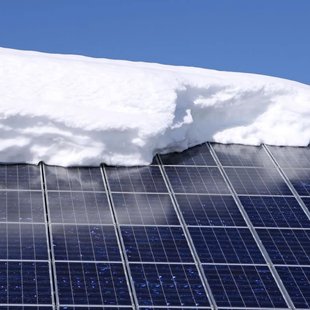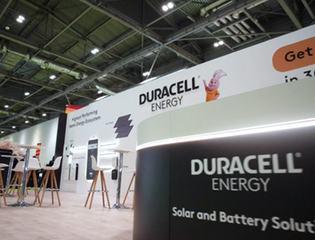How Much Solar Panel Power Output in Winter vs Summer?
20 October 2024

Solar energy is an excellent renewable energy source. It is green, free and simple to use.
Solar panels are an easy and efficient way to capture the energy produced by the sun and use it to power your home. By pairing your solar panels with a home battery you will be able to store the energy produced by your solar panels during the day until you need it during the evening. The rise of technology around home batteries has reduced one of the main hurdles to solar power as a practical household energy solution. The other issue with solar power is the variation in energy produced between the winter and the summer months. It is not just the grey skies that reduce the energy produced, but the shortened day length which has a significant effect. However, solar panels do still produce energy in the winter, and there are ways to help mitigate the reduced power output.
Solar Panel Output: Summer vs. Winter
During high summer the days are endlessly long, and solar energy is produced throughout these days. The daylight hours are substantially greater than in the depths of winter. In midsummer, we can enjoy over 16 hours of daylight, while at the winter solstice, this is reduced to just over 7 hours. Even if the weather were consistent throughout this time, this would still massively reduce the amount that could be generated. Sadly, along with the short days comes bad weather, with cloudy skies and rain, which further decreases the amount of light in the sky. Furthermore, in the winter, the sun is at a lower angle, so may not reach your solar panels in the same way.
Factors Influencing Solar Energy Production
Impact of Seasonal Changes on Solar Production
Solar production is significantly reduced during the winter, by as much as 80% compared to the summer months. This is down to the shorter day length, the increased cloud cover, and the lower angle of the sun.
The Role of Temperature and Temperature Coefficients
While we may assume that hotter is better when it comes to solar panels, actually the converse is true. Solar panels actually operate more efficiently when cooler, as the lower temperatures allow the electrons to move more freely, boosting power generation capacity. At temperatures below 25C, a solar panel’s efficiency increases by up to 0.5% per degree.
Challenges of Solar Production in Winter
Lower Sunlight Hours and Sun Angle
The decreased sunlight hours during the winter are a major cause of the reduced output during the winter months. This combined with the lower sun angle, reduces the effectiveness of the solar panels during the winter. It is possible to partially combat this by adjusting the tilt of the panels so that they capture more of the sun’s energy.
Weather Factors and Cloud Cover
It isn’t only the shorter days that affect the solar power output in the winter months, but the level of cloud cover, and weather conditions. Some winter days can be bright and sunny, and on these days you can still enjoy a fair amount of solar power, but on a grey and rainy day, with thick clouds, your solar power output will be significantly reduced.
Does Reduced Solar Production in Winter Increase Energy Bills?
If you cannot produce enough energy during the winter to cover the amount of energy that you consume then you will need to buy energy from the grid. However, if you have a larger solar panel system so that you overproduce energy in the summer, which you can then pay back to the grid, then you might be able to generate enough power during the winter. Generally, though, your energy bills will be higher in the winter, but many people spread the payments across the year so that your financial position is better.
Maximising Solar Energy Generation Year-Round
Optimal Panel Placement
Consider adjusting the tilt of the panels for the winter months, so that you can capture as much of the sun’s power during this time when it is lower in the sky.
Regular Maintenance
Regular maintenance and check-ups will ensure that your solar panels are working as efficiently as possible.
Battery Storage Solutions
Being able to store the energy generated is crucial to optimising the energy produced. This is particularly important during the winter when you will be mainly at home once the sun has set.
Efficiency Improvements and Smart Energy Management
Make the most of the energy that you produce by making your home as efficient as possible. Managing your energy wisely will help to keep your bills down.
Seasonal Adjustments and Monitoring
If you adjust your solar panels in the winter, then remember they need to be adjusted back for the summer months. Monitor your output and your energy usage, so that you understand your overall energy patterns.
UK Climate and Solar Energy Potential
The UK is renowned for being grey during the winter. This will affect the output of your solar panels and needs to be taken into consideration. Other climates may have different issues such as overheating during very hot summers.
What to Expect From Solar Production in Winter Months
Remember that your solar panels are expected to reduce output by as much as 80% during the winter compared to the summer. This will depend on the location of your panels, for example, if high trees block out the low-lying winter sun, the efficiency rating of the panels, the better the rating, the more winter sun they will capture, and the angle of the panels, which you can have adjusted for the winter months. It is worth optimising your panels for winter, to offset the reduced output that will occur.
Optimise your Solar Output with a Duracell Energy Home Battery
One of the best ways to optimise your solar panel output is to store the energy generated with a home battery. Duracell Energy home batteries, EV chargers, and inverters all work together with our impressive app to give you complete control of your entire household energy system. Embrace a greener tomorrow, with Duracell Energy home batteries today. Simply use our online quote calculator to help you choose the best solar battery storage set-up for your home.


